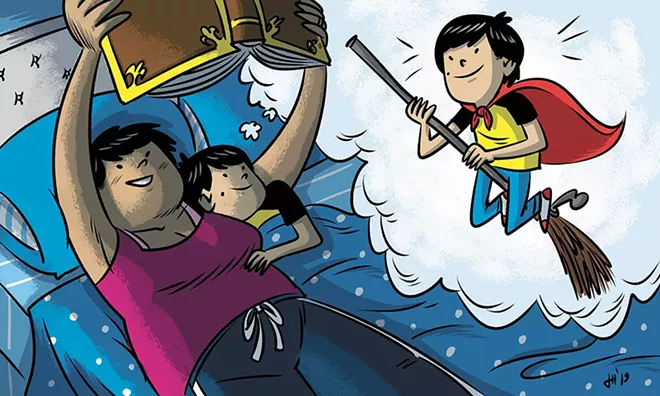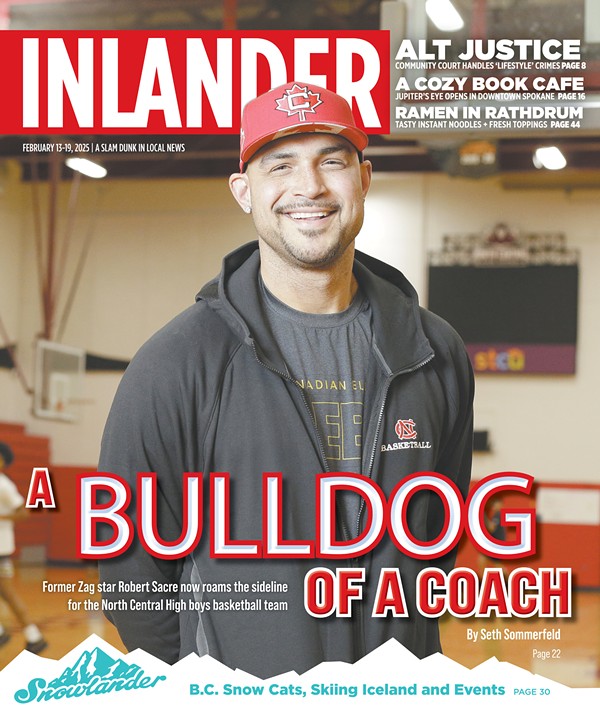Spokane children's poet Kenn Nesbitt says he learned to love literature and reading aloud out past the AM waves on long car rides. Driving into the mountains on childhood road trips, the radio signal would slip into static and the family Cadillac would come alive with verse.
"We didn't have an eight-track player or a cassette player in the car," he says, "so basically my parents would tell stories and sing songs and recite poems to keep my brothers and I from fighting, more or less."
Instead of thumbing at Game Boys, they would listen as their father recalled "Casey at the Bat" or "The Raven" from memory. Nesbitt says he came to know many of them by heart as the words and rhythms spun in his mind long after the trip. It sparked a lifelong passion.
Nesbitt, who served as Children's Poet Laureate from 2013 to 2015, says reading aloud with his parents solidified family connections, sparked lasting memories and introduced him to a wonderful world of words.
"I just loved it," he says. "I'm not a zealot on 'you have to read poetry to your kids,' but I am a zealot on 'you have to read to your kids.'"
In a world of endless distractions and over-packed schedules, reading aloud with children can get squeezed out, but reams of research confirm the many benefits. It helps cement parent-child bonds. It boosts speech development and vocabulary. It corresponds with advanced reading skills and academic performance — across broad social or class disparities.
"Reading regularly with young children stimulates optimal patterns of brain development and strengthens parent-child relationships at a critical time in child development," reads a policy statement from the American Academy of Pediatrics, "which, in turn, builds language, literacy, and social-emotional skills that last a lifetime."
Classic guides like Jim Trelease's "The Read-Aloud Handbook" also emphasize its role in fueling personal curiosity, enhancing focus and fostering empathy.
And it's usually pretty fun.
Read-aloud evangelists agree it's never too early, or late, to start. So how can we try to read more with our kids?
Gwendolyn Haley, a library services manager with the Spokane County Library District, says families can make reading aloud a part of their daily routine. Take stock of when you might have unhurried time in the day — at breakfast, after school, during bedtime — and have some favorite books ready to go.
Almost all libraries offer age-appropriate reading lists. Haley and others suggest picking books you like to read to start, then give kids more control over what you read together as they develop their own tastes.
"Book choice is so important," she says. "If you hate it, they will know."
Reading aloud with children helps introduce advanced ideas or emotions. Children can often hear and understand concepts at levels above what they could comprehend while reading independently. Haley says those organic conversations during reading have huge developmental benefits.
"Those discussions we have around our reading are just so important," she says. It's a great opportunity for our children to have conversations about what the characters in the book are doing and experiencing and how do we think they're feeling about that and what would we do in the same situation."
Research shows the literal number of books in a home can correspond with reading comprehension. Make books easy to find around the house. Make frequent trips to the library for new material and give kids ownership over a few of their own cherished books.
Haley encourages parents to give kids permission to dislike some books and move on to something that resonates or holds their attention better.
"Books aren't broccoli," she says, "you don't have to clean your plate."
Experts suggest rekindling or doubling down on your own reading. Parental modeling, reading newspapers or books on your own also plays a large role in showing kids that you value reading and that it is something grown-ups enjoy. Haley says parents can make "invisible" reading on phones or tablets more recognizable by talking to kids about what they're reading.
While some may see technology as undermining traditional reading, both Nesbitt and Haley praised audio books and e-books to providing additional means for connecting kids to literature. Reading together has extra benefits, but audio books can still bring families together to listen to stories.
Nesbitt has written 23 books and has audio versions of many of them. The sounds of the words are part of what makes poetry special.
"Poetry is somewhat magical for kids," he says. "It's rhythmical. It's got rhymes. It's got a lot of poetic devices, assonance and alliteration and things like that that make it memorable."
Haley says her family uses a smart speaker to listen to books together and that they also appreciate having access to e-books for making text size larger or tracking down hard-to-find books.
Spokane area libraries also have new digital resources for joining online book clubs or getting recommendations through NoveList, which Haley called a sort of Pandora for books that offers titles based on previous favorites.
As children get older, experts note it can be harder to find ways to connect. Shared stories create literary touchstones for family values, traditions or inside jokes that last a lifetime.
"You're sharing an experience with them," Nesbitt says, "and you're learning something about their world as well... I just can't think of a better thing to do with your kids."
















